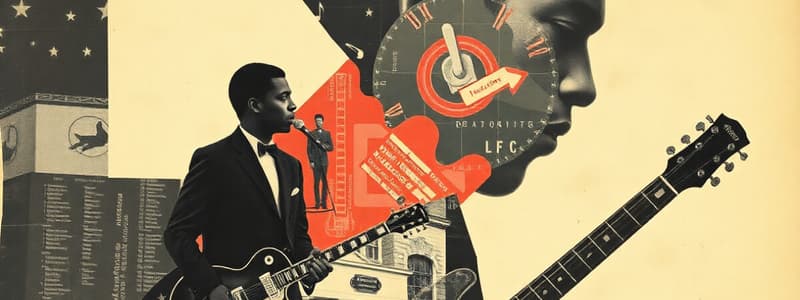Podcast
Questions and Answers
Which of these artists is NOT typically associated with soul music?
Which of these artists is NOT typically associated with soul music?
- James Brown
- Sam Cooke
- B.B. King (correct)
- Otis Redding
What primary musical influence does soul music heavily derive from?
What primary musical influence does soul music heavily derive from?
- Classical
- Reggae
- Metal
- Gospel (correct)
What defines the rhythmic structure of funk music?
What defines the rhythmic structure of funk music?
- Orchestral arrangements
- Complex time signatures
- Very simple structure (A,B,A,B) (correct)
- Lyrical complexity
Which of the following is a key feature of funk music?
Which of the following is a key feature of funk music?
Which of the following instruments is typically associated with funk music?
Which of the following instruments is typically associated with funk music?
What element distinguishes funk from other genres like jazz or soul?
What element distinguishes funk from other genres like jazz or soul?
Which of these musical devices is commonly used in funk music?
Which of these musical devices is commonly used in funk music?
Flashcards
Soul Music
Soul Music
Originating in the African American community in the late 1950s and early 1960s, soul music blends gospel, rhythm and blues, and blues music. Known for its emotional lyrics often addressing love and social issues faced by African Americans.
Why 'Soul' Music?
Why 'Soul' Music?
Soul music derives its name from its origins in gospel music sung and played in African American churches. It's rooted in saving people's souls.
Funk Music
Funk Music
A music genre that originated in Black American communities in the mid-1960s, combining elements of soul, jazz, and rhythm and blues to create a rhythmic, danceable sound.
Funk's Origins
Funk's Origins
Signup and view all the flashcards
Natural Minor Scale
Natural Minor Scale
Signup and view all the flashcards
Extended Chords
Extended Chords
Signup and view all the flashcards
Riff-based Sections
Riff-based Sections
Signup and view all the flashcards
Simple Song Structure
Simple Song Structure
Signup and view all the flashcards
Study Notes
Funk Music and Soul Music
- Funk music emerged in the mid-1960s from Black American communities
- It combined elements of soul, jazz, and R&B in a rhythmic, dance-oriented way
- Soul music originated in the late 1950s and early 1960s among African Americans in the US
- It grew from gospel, rhythm and blues, and blues
- Soul music often addresses love and social issues, especially those faced by African Americans
- Soul music takes elements from jazz and rhythm and blues however it’s roots are in gospel music performed in African American churches
- The term "soul" is connected to gospel music's purpose of saving people's souls
Important Artists and Musicians
- Sam Cooke
- Ray Charles
- James Brown
- Aretha Franklin
- Otis Redding
- Marvin Gaye
- The Supremes
- The Funk Brothers
Funk Theory
- Identifying musical devices used within Funk music
- The study of musical theory concerning the genre Funk
Musical Devices
- Natural Minor (or Major scale)
- Extended Chords (7th, 9th, 13th extensions)
- Riff-based sections
- Simple structure (e.g., A, B, A, B)
- Strong downbeats followed by 8th or 16th note grooves
- Syncopation
Blues Scale
- Minor scale is a heptatonic scale
- Major scale: 1, 2, 3, 4, 5, 6, 7
- Minor scale: 1, 2, b3, 4, 5, b6, b7
Two Modes
- Mixolydian: 1, 2, 3, 4, 5, 6, b7
- Dorian: 1, 2, b3, 4, 5, 6, b7
Blues Scales In Context
- Major: C, D, E, F, G, A, B
- Minor: C, D, Eb, F, G, Ab, Bb
Review
- Next time, revise musical devices from the Funk genre
Studying That Suits You
Use AI to generate personalized quizzes and flashcards to suit your learning preferences.




